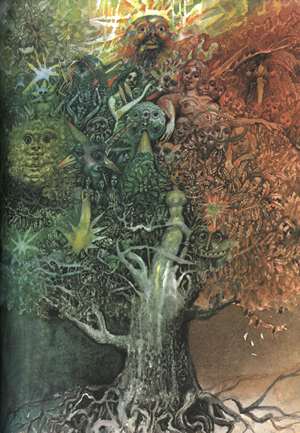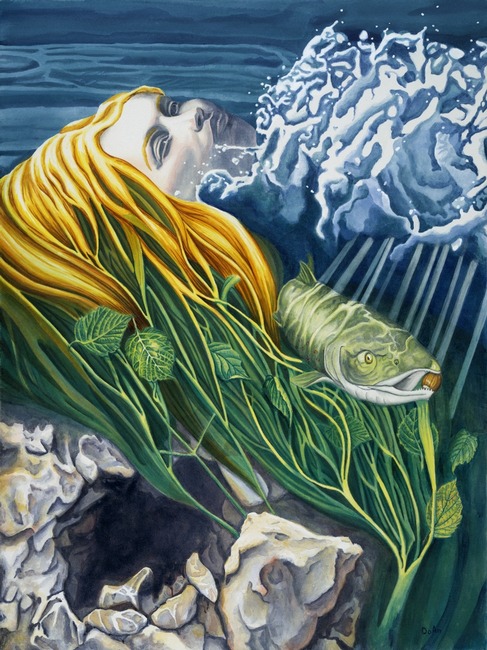Boann
Boann is the Irish goddess of the river
Boyne. Her name means “She of the white
cattle.” She was the wife of Nechtain and the
beloved of the Dagda, the Good God. It is
possible she could be a later naming of Danu Herself.
Aenghus mac Og, her son, was the product of the affair
between Boann and Dagda. In order to keep the pregnancy secret,
the Dagda halted the sun for the term of the goddess's
pregnancy, and so Aenghus was born out of time.
Boann is a Goddess of fertility and the
stars. She connects the Way of the White Cow to the White Mound
of the Boyne. She gives her name to the preeminent brugh in all
of Ireland, Brugh na Boinne. She is honored
mid-winter at Imbolc.
Many ancient peoples had stories of floods
in which water was both honored as a life bringer and as a
destroyer. Water was seen as something that
“escaped” from the realms of the gods.
In many of the stories it seemed to be a
female who was involved when water would through some disaster,
come to the land bringing growth and abundance though
turbulence.
Probably the most famous version of this
myth in Celtic tradition is the Irish story of the Well of
Segais.
Growing around this well were nine hazel
trees of wisdom, whose nuts fell into the water and gave it the
quality of divine illumination, much sought-after by those
seeking this wisdom.
Boann was the wife of Nechtan, keeper of the sacred Well of Segais, which was a source of knowledge. Only Nechtan and his cupbearers were permitted to approach the well. The goddess Boann desired to drink from the well herself, to increase her power.
 She attempted to challenge the Well of
Segais. This involved going around the well chanting,
circling widdershins (counterclockwise, or against the sun
direction) . She circled the well three times, as she chanted
“amrun.” The well rose against her
incantations. Three waves rose up from the well which then
flowed forth in five streams and drowned her. Because she was of
the Sidhe, she did not die. She lost an arm,
a leg and an eye in her battle with the well.
She attempted to challenge the Well of
Segais. This involved going around the well chanting,
circling widdershins (counterclockwise, or against the sun
direction) . She circled the well three times, as she chanted
“amrun.” The well rose against her
incantations. Three waves rose up from the well which then
flowed forth in five streams and drowned her. Because she was of
the Sidhe, she did not die. She lost an arm,
a leg and an eye in her battle with the well.
The five streams of wisdom that flowed from
this well represent our five senses: taste, smell, feeling,
sight and hearing. In her contest with the Well of Segais, Boann
experienced “shamanic death" of drowning. In
so doing, she gained the Wisdom of Segais as it swept her away.
Manannan said of this….
"I am Manannan, son of Ler, king of the
Land of Promise; and to see the Land of Promise was the reason I
brought [thee] hither. . . . The fountain which thou sawest,
with the five streams out of it, is the Fountain of Knowledge,
and the streams are the five senses through which knowledge is
obtained. And no one will have knowledge who drinketh not a
draught out of the fountain itself and out of the streams."
From this, we learn that we must experience
through all of who we are, through all of the five senses which
must be open. This is our gift from Boann.
Boann can be a great ally for poetic
composition and many other forms of artistic expression.
Invoking or singing Boann's name while sitting next to a river
or stream can be a very powerful and inspiring experience. Clear
the mind, open the soul, and listen to the music of Boann
playing from the waters. You will always go away a new person.
Vigil at the Well
A rock ledge.
A dark pool.
And a woman alone
holding three coins.
She circles the well
three times in the rain.
She offers the coins
to a great ancient tree
then bends to the pool.
A glimmer of silver.
Dawn striking the pool?
A fish in its depths?
The pool stills again.
The sky blazes red.
The woman gets up.
Nothing seems changed.
But the next day a wind
blows warm from the sea.
Seasons of the Witch by Patricia
Monaghan
